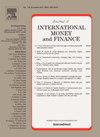对冲制裁风险:央行储备中的加密货币
IF 3.3
2区 经济学
Q2 BUSINESS, FINANCE
引用次数: 0
摘要
中央银行可能会转移其国际储备,以事先保护自己免受法定储备货币发行国的金融制裁风险。例如,从2016年到2021年,面临美国制裁风险较高的国家比面临美国制裁风险较低的国家增加了其储备中的黄金份额。本文探讨了比特币作为另类对冲资产的潜力。我描述了一个动态贝叶斯联结模型来模拟比特币和其他储备资产在各种可能的制裁概率下的联合回报,量化不同制裁风险水平增加黄金、人民币和比特币最优配置的程度。我的结论是,制裁风险可能会削弱美国国债的吸引力,推动央行储备更广泛的多元化,并支撑加密货币和黄金的长期基本价值。本文章由计算机程序翻译,如有差异,请以英文原文为准。
Hedging sanctions risk: Cryptocurrency in central bank reserves
Central banks may shift their international reserve holdings in order to protect themselves ex-ante against the risk of financial sanctions by fiat reserve currency issuers. For example, from 2016 to 2021, countries facing a higher risk of US sanctions increased the gold share of their reserves more than countries facing a lower risk of US sanctions. This paper explores the potential for Bitcoin to serve as an alternative hedging asset. I describe a dynamic Bayesian copula model to simulate the joint returns of Bitcoin and other reserve assets under a wide range of plausible sanctions probabilities, quantifying the extent to which varying levels of sanctions risk increase optimal gold, renminbi, and Bitcoin allocations. I conclude that sanctions risk may diminish the appeal of US Treasuries, propel broader diversification in central bank reserves, and bolster the long-run fundamental value of both cryptocurrency and gold.
求助全文
通过发布文献求助,成功后即可免费获取论文全文。
去求助
来源期刊

Journal of International Money and Finance
BUSINESS, FINANCE-
CiteScore
4.20
自引率
4.00%
发文量
141
期刊介绍:
Since its launch in 1982, Journal of International Money and Finance has built up a solid reputation as a high quality scholarly journal devoted to theoretical and empirical research in the fields of international monetary economics, international finance, and the rapidly developing overlap area between the two. Researchers in these areas, and financial market professionals too, pay attention to the articles that the journal publishes. Authors published in the journal are in the forefront of scholarly research on exchange rate behaviour, foreign exchange options, international capital markets, international monetary and fiscal policy, international transmission and related questions.
 求助内容:
求助内容: 应助结果提醒方式:
应助结果提醒方式:


